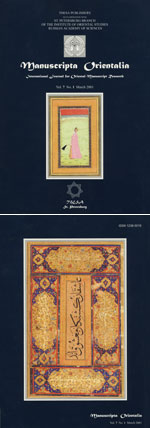|
|
| |

|

|
Kumamoto H. Sino-Hvatanica Petersburgensia (Part I) // Manuscripta Orientalia. Vol. 7. No. 1. March 2001. P. 3—9.
The manuscript fragments we deal here with are the following:
Дх 18926 + SI P 93.22 + Дх 18928; Дх 189I6;
Дх 18927; Дх 18930; Дх 18931; Дх 1461. They all belong to
the St. Petersburg Branch of the Institute of Oriental Studies
(Russian Academy of Sciences), but no transcription or interpretation
of them was given in Saka Documents VII: the
St. Petersburg Collections (1993) by R. E. EMMERICK and
M. I. VOROB'EV A-DES'ATOVSKAYA and Saka Documents Text Volume III: the St. Petersburg Collections (1995)
by the same authors. The reason these manuscripts first escaped
the close attention of the editors of the above-mentioned
volumes seems to be that all fragments contain
Chinese text, with few portions of Khotanese added. In fact,
they are more Chinese than Khotanese documents. For this
reason, the fragments were put aside to be included in a future
publication of Chinese documents from Central Asia.
Although the manuscripts bear call numbers with signature
Дх to indicate their Dunhuang origin, and are classified
among Chinese Dunhuang documents, the Chinese texts. as
well as the Khotanese ones, clearly show that the manuscripts
come from the Gaysāta area (in the Domoko oasis north-cast
of Khotan); they can be dated to the second half of the eighth
century.
Of these manuscripts with Chinese and Khotanese
texts, however, only Дх 18926 + SI P 93.22 + Дх 18928
(and probably a small fragment Дх 18930) can be called
a bilingual document in the sense that the Khotanese text
appears to be an interlinear translation of the Chinese.
We find the same method of interlinear translation, with
a Chinese text representing an original official document
and the Khotanese a gloss to it for the benefit of the non-Chinese
local population in Hedin 24. This text is unfortunately
more fragmentary than ours. There is also
a series of bilingual voucher entries (Hedin 15. 16,
Dumaqu C. D). in which the Chinese text appears to be
primary, too.
As for our texts. part of Дх 18927 shows that the
Khotanese text relates to the preceding Chinese text,
whereas in all others (Дх 18916, Дх 18931, Дх 1461 and
the remaining part of Дх 18927) the Chinese and Khotanese
texts are independent.
We note here that in the present article, the Chinese
texts are dealt with only if they have some relation to the
Khotanese texts. We leave the proper interpretation of the
Chinese texts to specialists in the field...
К содержанию выпуска...
 PDF-файлы PDF-файлы
Полный текст статьи
Ключевые слова
рукописи дуньхуанские
рукописи китайские
фонд дуньхуанский
Хотан
|
|
|
|
Случайная новость: Объявления |
|
18 ноября 2024 г. (понедельник) в 14:00 состоится заседание Ученого Совета, на котором будет заслушан научный доклад г.н.с., д.и.н. С.А. Французова «Антикальвинистские трактаты предстоятелей восточных христианских Церквей в отделе рукописей РНБ (1671–1673 гг.)». |
|
Подробнее...
|
|
|
|
|

